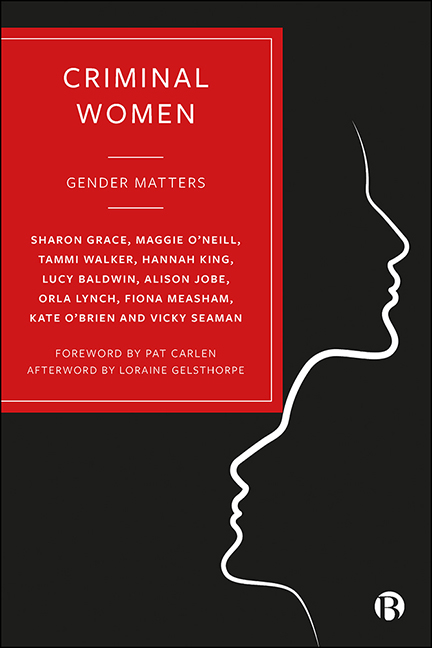Book contents
- Frontmatter
- Contents
- List of Figures and Table
- Notes on the Authors
- Acknowledgements
- Foreword
- Introduction
- 1 Hearing the Voices of Women Involved in Drugs and Crime
- 2 Knifing Off? The Inadequacies of Desistance Frameworks for Women in the Criminal Justice System in Ireland
- 3 Sex Work, Criminalisation and Stigma: Towards a Feminist Criminological Imagination
- 4 Criminal Women in Prison Who Self-harm: What Can We Learn from Their Experiences?
- 5 Criminal Mothers: The Persisting Pains of Maternal Imprisonment
- 6 ‘The World Split Open’: Writing, Teaching and Learning with Women in Prison
- 7 Women’s Biographies through Prison
- Afterword
- Index
- Frontmatter
- Contents
- List of Figures and Table
- Notes on the Authors
- Acknowledgements
- Foreword
- Introduction
- 1 Hearing the Voices of Women Involved in Drugs and Crime
- 2 Knifing Off? The Inadequacies of Desistance Frameworks for Women in the Criminal Justice System in Ireland
- 3 Sex Work, Criminalisation and Stigma: Towards a Feminist Criminological Imagination
- 4 Criminal Women in Prison Who Self-harm: What Can We Learn from Their Experiences?
- 5 Criminal Mothers: The Persisting Pains of Maternal Imprisonment
- 6 ‘The World Split Open’: Writing, Teaching and Learning with Women in Prison
- 7 Women’s Biographies through Prison
- Afterword
- Index
Summary
The origins of this book lie in collaborative discussions with a group of feminist criminologists, sociologists and psychologists: the Criminal Women Voice, Justice and Recognition Network (CWVJR) who came together to develop research and scholarship which aims to centre women's voices and lived experiences. This book draws on each co-author's body of research in their field of expertise and on a range of research projects, practice and activities. As such the aim of this book is to bring together a body of feminist research on ‘criminal women’ that critically examines women's reasons for engaging in ‘criminal’ activity and the challenges they face in ‘attempting to become women of their own making’ (Carlen et al, 1985: 1).
The authors were inspired by Pat Carlen's 1985 landmark book made up of four biographical accounts written with four women – Chris Tchaikovsky, Diana Christina, Jenny Hicks and Josie O’Dwyer. ‘Criminal Women tells the stories of four women who, in attempting to become women of their own making, became deeply involved in crime’ (Carlen et al, 1985: 1). Using the narrative/biographical accounts by the four women, Carlen challenged both the ‘othering’ of women who commit crimes and explanations that suggest women should adapt themselves better to social norms. Following the work of Heidensohn (1968) and Smart (1978), Carlen analysed women's experiences, paying attention to ‘the complex and concealed forms of oppression and social control to which women are subject’ (Smart, 1978, cited in Carlen et al, 1985: 6) and explores the possible options and responses for women in the context of a ‘class riven and deeply sexist society’ (Smart, 1978, cited in Carlen et al, 1985: 6). Similarly, this book is centred on a biographical approach to criminology and a commitment to creating space for women's voices to be heard and shared. Using Carlen's pioneering text as our starting point, some 35 years later, our aim was to critically examine the experiences and narratives of women in the criminal justice system (CJS) based upon extensive empirical research and narrative interviews with women. Through exploring the complexities of social disadvantage in terms not only of gender, but of the intersecting experiences and oppressions of class, race and age, we aim to show how unhelpful gendered stereotypes of victims and offenders result in injustice.
- Type
- Chapter
- Information
- Criminal WomenGender Matters, pp. 1 - 13Publisher: Bristol University PressPrint publication year: 2022

